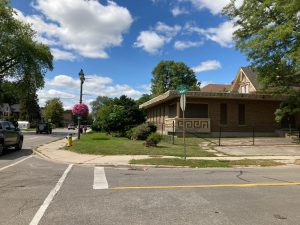Cinematic-quality land use hearings were held on Oct. 25, 2021 in the City of Stratford, and on Jan. 10, 2022 in the Town of Niagara on the Lake; here’s a quick film review
In days past, when I was a freelance writer for Cinema Canada in the late 1970s, I used to write film reviews.
However, my feature articles were my primary form of writing for the magazine.
From time to time I still get inquiries, from people delving into Canadian film history, about some of the articles. I’m pleased some things that I’ve written are still being read.
These days, I write reviews of video recordings of land use hearings.
City of Stratford
The current post is dedicated to a review of an Oct. 25, 2021 online land use meeting in the City of Stratford.

View looking west from the corner of Queen Street (in foreground) and Ontario Street (on left) in Stratford. Jaan Pill photo
The current post is dedicated as well to a review of a Jan. 10, 2022 online land use meeting in Niagara on the Lake.
A previous post (among others) highlights the issues at play in the above-noted Stratford meeting:
By way of an update on this story, an Oct. 26, 2021 Stratford Beacon Herald article is entitled: “Contentious Ontario Street development back on track.”
Niagara on the Lake
The story from Niagara on the Lake, meanwhile, it outlined at a previous post:

Proposed Parliament Oak redevelopment. Image source: July 7, 2021 Niagara Now article entitled: “Parliament Oak plan ‘outrageous,’ incompatible with Old Town, residents say.”
I am still writing film reviews. The recordings of the two land use meetings, one in Stratford in October 2021, the other in Niagara on the Lake in January 2022, are instances of contemporary online filmmaking.
As you may or may not know, filmmakers tend to use the terms video and film interchangeably.
My review of online land use meetings in Stratford and Niagara on the Lake
My review is based on what I recollect of these engaging, compelling online videos, which are focused on topics where much is at stake.
The most recent video depicts a meeting held on Jan. 10, 2022. I learned of this event from Mike James, who lives in Niagara on the Lake. For many years Mike and I led Jane’s Walks in South Etobicoke when I lived in Long Branch and Mike lived in Brampton. We share a keen history in local history.
The tone of the Niagara on the Lake meeting regarding the Parliament Oak redevelopment proposal was uniformly positive. The Stratford meeting regarding a redevelopment proposal, for a stretch of land between Queen Street and Trow Avenue, on the north side of Ontario Street, had a less positive feeling attached to it.
The residents who spoke in opposition to the Parliament Oak proposal as it currently stands uniformly adopted a tone of cordiality, even when they spoke strongly in opposition to the proposal.
The residents who spoke in opposition to the Queen Street proposal in some cases adopted a tone of cordiality but in other cases expressed strong contempt. In my capacity as a film reviewer, I can say that beyond a doubt, a tone of cordiality, when speaking strongly against a proposal, is going to have stronger traction; such a tone makes for a stronger demonstration of human agency.
I’m reminded of a book I read – I think it was by Zig Ziglar – in the late 1960s when I was a student at Simon Fraser University at its mountaintop campus in Burnaby, B.C.
The book spoke of salesmanship and marketing as involving a process where you walk alongside the person you are trying to sell something to. If you stand in front of the person and block their way, you’ll do great at blocking their way, but you’re not going to sell them anything.
It occurs to me that, in such a situation, you won’t sell a person anything, unless, that is, the power dynamics are of such a nature that you have a capacity to exert effective coercion. In that case, you’re not selling something but are, instead, engaging in coercion.
At the Stratford meetings (I’ve attended a couple of them) that I’ve observed online, we had a presentation where an architect used a series of slides to very effectively present an alternative way to approach the Queen Street site, in such a way that development proceeded while keeping heritage attributes of the local streetscape intact.
It was a great proposal, in my estimation, but it was clear that the decision makers at the other end had no interest. The atmosphere was of such a nature that receptivity to suggestions did not appear, from what I could pick up, to be on the day’s agenda. The body language of some of the listeners (there were exceptions; I do not want to generalize too much) in the Stratford video was more impassive than was the case with the body language on display at the Niagara on the Lake video.
One speaker opposed to the Parliament Oak proposal spoke in the persona of a Shakespearean actor. He played the role to perfection. Accolades all around!
At the Niagara on the Lake event on Jan. 10, 2022, another resident, who indicated (and demonstrated) that she had a strong public policy background, went through a series of slides offering alternative ways to address the Parliament Oak site.
The presenter, who expressed herself forcefully, with confidence, and with energy (without making a show of any of this), shared her slides by way of cordial suggestions that the developer might, possibly, wish to consider.
I have the sense (and I could be wrong, of course) that the decision makers in the Niagara on the Lake scenario would, possibly, be more open to such suggestions that was the case when alternatives were suggested in Stratford.
The final presentation from residents at the Niagara on the Lake meeting featured a marketing professional who demonstrated a strong grasp of marketing in the context of what I would describe as heritage tourism. The microphone system he was using did not work well, however, and the content of the message was garbled. So, what to do?
One of the key decision makers, at the other end in Niagara on the Lake, made a great suggestion. She asked if the resident could send an additional email, on top of one that he’d already sent. In the second email, the details that were garbled, in the call to the meeting, would be clear to the members of the Town of Niagara on the Lake Council and so the message could be taken closely into consideration.
This concludes my review. I now look forward to seeing how each of the cinematic land use processes, in Stratford and in Niagara on the Lake, will proceed.

Leave a Reply
Want to join the discussion?Feel free to contribute!